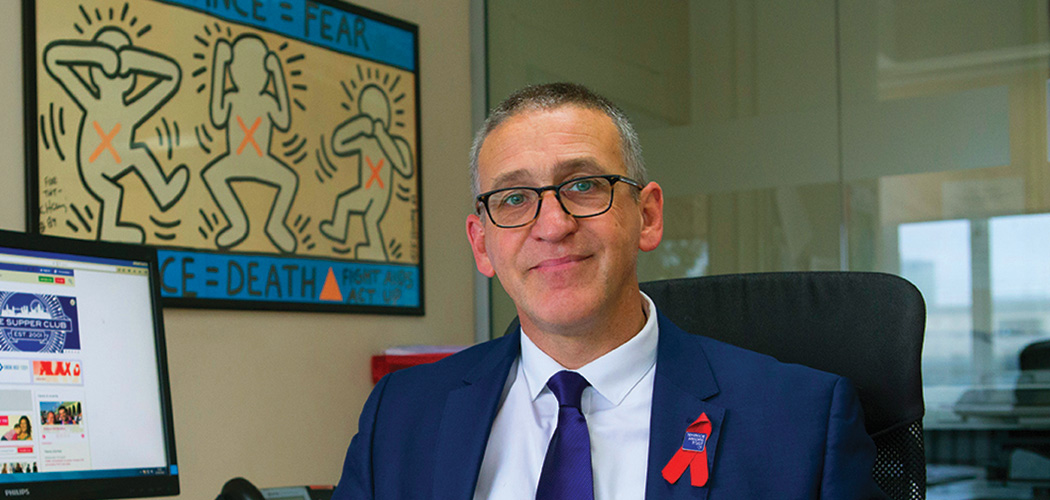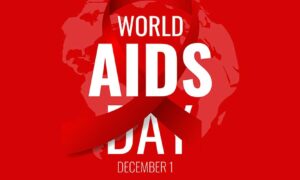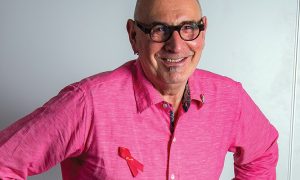Ian Green joined the Terrence Higgins Trust in March as its new chief executive. Prior to Ian’s appointment, the Trust had suffered a difficult period. David Bridle asked the charity’s new head about his own HIV diagnosis, PrEP and his plans for the Trust going forward.
What was your career before joining THT?
Most of my paid career has been within the YMCA. I had a number of roles over 25 years. I was chief executive of the YMCA national body for five years and then for almost three years on the executive of the World Alliance of YMCAs. Outside of paid work I’ve always had a number of non-executive roles: elected member of Ealing Council for 20 years, chair of Ealing Hospital, a number of housing association boards and I’ve been involved in a number of charities as trustee.
What’s also very relevant is you are HIV positive…
Yes – and have been for around 20 years. I was diagnosed in the summer of 1996. Like gay men of my age I was regularly getting tested for HIV. I was doing some work for the YMCA in the Palestine territories, recently had an HIV test which was negative, and got rather unwell whilst undertaking some work in East Jerusalem. I didn’t really think at this point in time that this could be sero-conversion illness. I went to see my GP, who was a friend of mine, and after a number of tests, he said let’s do another HIV test just to rule it out. That’s when I discovered I was HIV positive. Actually my GP knew the results on the Friday, and we were together with a group of friends at the Summer Rites festival over the weekend, and he kept it confidential until I went back to see him on the Monday.
Were you surprised at the result?
I was at that point in time. Was I surprised that I would become HIV positive? At that point in my life, probably not. I tried to be careful, I tried to make sure I was being responsible about my sexual health, but it didn’t always work. I wasn’t consistent. I was very fortunate that just at the time that I was diagnosed antiretrovirals were beginning to be prescribed on a trial basis. I went to the Chelsea and Westminster Hospital and was immediately put on a trial. The side-effects from the medication were absolutely awful and the particular regime I was on really did affect my life. But I was very fortunate, compared to some of my friends who died from HIV related illnesses, that there was medication available for me almost immediately on diagnosis.
So you never had any AIDS symptoms?
No, none whatsoever; it was just side-effects to medication. Of course over a period of time medication has become far more tolerable and I’ve been on the same regime for almost 15 years. So I don’t cost the NHS very much at all, as all my drugs are off patent.

You joined the THT at a point when the organisation had been through a tough time. There was the departure of one chief executive and a subsequent employment tribunal, and you’ve had the resignation of the chair and other trustees from the board. Can you tell us how these events have impacted on THT and your staff?
You’re right to say there have been challenging times. I think for me it’s about making sure that I’m providing that stability for the organisation going forward. There is an organisation full of really passionate people that just required really clear, consistent leadership. I hope that I’ve been able to bring that leadership to the organisation.
THT has had criticism over the years in the gay and HIV communities, including from us here at Boyz. How do you view this criticism?
THT was often viewed negatively externally. Sometimes I think that was fair, sometimes unfair. Being the largest [HIV] organisation there are natural brickbats that are thrown, but I think sometimes the approach that THT had to partnership working was not particularly conducive to sector development. The default mechanism for THT now is we will always look to work in partnership unless there’s a good reason not to. I hope that the narrative around THT is beginning to shift and to change. I’m conscious there’s a lot more work that needs to be done. If we do want to see the end of HIV transmissions in the UK – which I think is doable – we can’t do this alone, we can’t do this in isolation.
What are THT’s future plans?
We have a new strategy called ‘Bold Ambitions’. There are three pillars, one is about ending HIV transmission and improving sexual health. There are still 17% of people who have HIV who are unaware, so one of the ways of ensuring we are in a position to eradicate the transmission of HIV is to make sure people are tested. If they’re tested and they’re positive they get on to treatment and, as we now know, if people are on treatment and have a suppressed viral load, that means they are uninfectious. That is for me a really important message that still, particularly in the gay community, not everybody knows. We need to make sure that HIV testing is normalised and that we’re providing people with the opportunity to be tested in a venue that’s suitable to them, so that could be with their GP, at a GU clinic, it could be in a sex on premises venue, it could be they test themselves at home either with a self test kit or a postal kit.
But infections remain stubbornly high – well over 3,000 new diagnoses in men who have sex with men last year, and some of those are recent infections. Do you think the current campaigns are working?
It’s a good question. Some of those I agree are recent infections, some also though are people who are late diagnosed, have now been tested and are getting on treatment, so that is a good sign. Are the campaigns working? I think that they are, but I think there is still more we need to do. The amount of resources for the campaigns has dropped substantially. We have to be thinking about how we are smarter in our campaigning and we need to make sure there are no mixed messages. So whilst stigma is still an issue – and I don’t wish to diminish it in any way because people still face stigma – we shouldn’t be scaring people not to get tested. We need to make sure we are far more nuanced in our language. I hope in the current campaign, “I’m not afraid of HIV”, we are actually beginning to see that in a really clear way.
How significant could PrEP be?
It could play a really important part but it’s not the whole answer. PrEP is part of the solution but not the whole solution. To target those who are at particular risk, those who may have had an STI in the last six months, perhaps involved in the chem sex scene and are HIV negative, PrEP could be a really important strategy for them. When I was diagnosed, to think that there could be a tablet that I could take that could protect me from HIV – and there is still this debate about whether it should be available – is absolutely perverse. I strongly believe PrEP should be available to those who are most at risk, and we need to just get over who is responsible for commissioning it, because whilst we do 17 people a day are being infected with HIV.
What happens if we don’t get PrEP?
If we don’t get PrEP more people will get infected and we will still have that stubborn level of the 6,000 people diagnosed each year, half of those being men who have sex with men. It’s a really important part of breaking the back of HIV. There are conversations happening at a national level with Public Health England which could bring another much larger scale trial but using generics.
What is your theme for this year’s World AIDS Day?
‘It’s not over’ – because it’s not over. Some people are thriving, some people aren’t, and some people really do need additional support. Local authorities are beginning to decommission some of the services that have been a lifeline for many people over many years. Whilst we as an HIV organisation need to make sure we are responding to the epidemic as it is now, we also need to ensure we are walking alongside people. I always talk about my journey with the virus; and I know from my journey there’s been times when I needed additional support, when I’ve need counselling and that needs to be funded.
What is your message to Boyz readers many of whom are sexually active, younger gay men?
Yep, full of testosterone – I’d say be confident in your sexuality. Be confident in who you are. Don’t fear HIV but be responsible. I’d always say to people, condoms are the best way of stopping the transmission of HIV. Take responsibility for your own sexual health: the work that Boyz has done over many years to make sure that message gets out there, but also that encourages people in their sexuality. It was certainly a really important part of my growing up, perhaps when I wasn’t as out as I am now. It’s really important that Boyz readers understand they are not alone particularly if they are fearful or worried about HIV.














